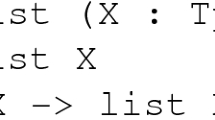Abstract
In a previous work, we proved that almost all of the Calculus of Inductive Constructions (CIC), the basis of the proof assistant Coq, can be seen as a Calculus of Algebraic Constructions (CAC), an extension of the Calculus of Constructions with functions and predicates defined by higher-order rewrite rules. In this paper, we prove that CIC as a whole can be seen as a CAC, and that it can be extended with non-strictly positive types and inductive-recursive types together with non-free constructors and pattern-matching on defined symbols.
Access this chapter
Tax calculation will be finalised at checkout
Purchases are for personal use only
Preview
Unable to display preview. Download preview PDF.
Similar content being viewed by others
References
A. Abel. Termination checking with types. Technical Report 0201, Ludwig Maximilians Universität, München, Germany, 2002.
F. Barbanera, M. Fernández, and H. Geuvers. Modularity of strong normalization and confluence in the algebraic-λ-cube. In Proceedings of the 9th IEEE Symposium on Logic in Computer Science, 1994.
H. Barendregt. Lambda calculi with types. In S. Abramski, D. Gabbay, and T. Maibaum, editors, Handbook of logic in computer science, volume 2. Oxford University Press, 1992.
F. Blanqui. Definitions by rewriting in the Calculus of Constructions (extended abstract). In Proceedings of the 16th IEEE Symposium on Logic in Computer Science, 2001.
F. Blanqui. Théorie des Types et Récriture. PhD thesis, Université Paris XI, Orsay, France, 2001. Available in english as “Type Theory and Rewriting”.
F. Blanqui. Definitions by rewriting in the Calculus of Constructions, 2003. Journal submission, 68 pages.
F. Blanqui. A short and flexible strong normalization proof for the Calculus of Algebraic Constructions with curried rewriting, 2003. Draft.
T. Coquand. Pattern matching with dependent types. In Proceedings of the International Workshop on Types for Proofs and Programs, 1992. http://www.lfcs.informatics.ed.ac.uk/research/types-bra/proc/.
T. Coquand and G. Huet. The Calculus of Constructions. Information and Computation, 76(2–3):95–120, 1988.
T. Coquand and C. Paulin-Mohring. Inductively defined types. In Proceedings of the International Conference on Computer Logic, Lecture Notes in Computer Science 417, 1988.
N. Dershowitz and J.-P. Jouannaud. Rewrite systems. In J. van Leeuwen, editor, Handbook of Theoretical Computer Science, volume B, chapter 6. North-Holland, 1990.
P. Dybjer. A general formulation of simultaneous inductive-recursive definitions in type theory. Journal of Symbolic Logic, 65(2):525–549, 2000.
J.-Y. Girard, Y. Lafont, and P. Taylor. Proofs and Types. Cambridge University Press, 1988.
R. Harper and J. Mitchell. Parametricity and variants of Girard’s J operator. Information Processing Letters, 70:1–5, 1999.
J.-P. Jouannaud and M. Okada. Executable higher-order algebraic specification languages. In Proceedings of the 6th IEEE Symposium on Logic in Computer Science, 1991.
J.W. Klop, V. van Oostrom, and F. van Raamsdonk. Combinatory reduction systems: introduction and survey. Theoretical Computer Science, 121:279–308, 1993.
R. Matthes. Extensions of System F by Iteration and Primitive Recursion on Monotone Inductive Types. PhD thesis, Ludwig Maximilians Universität, München, Germany, 1998.
C. McBride. Dependently typed functional programs and their proofs. PhD thesis, University of Edinburgh, United Kingdom, 1999.
N. P. Mendler. Inductive Definition in Type Theory. PhD thesis, Cornell University, United States, 1987.
C. Paulin-Mohring. Personal communication, 2001.
R. Pollack. Dependently typed records in type theory. Formal Aspects of Computing, 13(3–5):341–363, 2002.
Coq Development Team. The Coq Proof Assistant Reference Manual — Version 7.3. INRIA Rocquencourt, France, 2002. http://coq.inria.fr/.
B. Werner. Une Théorie des Constructions Inductives. PhD thesis, Université Paris VII, France, 1994.
Author information
Authors and Affiliations
Editor information
Editors and Affiliations
Rights and permissions
Copyright information
© 2003 Springer-Verlag Berlin Heidelberg
About this paper
Cite this paper
Blanqui, F. (2003). Inductive Types in the Calculus of Algebraic Constructions. In: Hofmann, M. (eds) Typed Lambda Calculi and Applications. TLCA 2003. Lecture Notes in Computer Science, vol 2701. Springer, Berlin, Heidelberg. https://doi.org/10.1007/3-540-44904-3_4
Download citation
DOI: https://doi.org/10.1007/3-540-44904-3_4
Published:
Publisher Name: Springer, Berlin, Heidelberg
Print ISBN: 978-3-540-40332-6
Online ISBN: 978-3-540-44904-1
eBook Packages: Springer Book Archive




